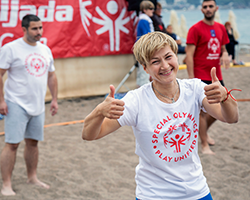Russian Special Olympics athlete keeps training during lockdown

Special Olympics Europe Eurasia
Special Olympics athlete Katya having fun during a pre-COVID-19 game of volleyball.
Katya Sazonova, who has an intellectual and hearing impairment, is a dedicated Special Olympics Judo, volleyball and alpine skiing athlete whose training did not stop when the COVID-19 lockdown came to where she lives in Moscow, Russian Federation.
Throughout the WHO European Region, 6 to 10 out of every 100 people live with a disability, amounting to an estimated 135 million people. Since 1968, the Special Olympics has provided sports training and athletic competition in a variety of Olympic-type sports for children and adults with disabilities, giving them continuing opportunities to develop physical fitness, experience joy, learn new skills and create friendships. The Special Olympics strives to create a better world by fostering the acceptance and inclusion of all people.
Katya says, “My mother didn’t want to give birth to me so she took pills and I was born with disabilities. I grew up in an orphanage where the other children laughed at me because I didn’t always understand the same things as them. At a new orphanage, I met my future coach and foster mother. They noticed I was very active and suggested I try sport – it changed everything.”
Disability empowerment through sports
Katya describes the impact of participating in the Special Olympics: “Sport gave me the desire to live and to ignore those who laughed at me. Kids didn’t want to play with me, even some adults didn’t accept me. Now the situation is different. I’m a champion, I love myself. I love what I do and I have a very supportive community around me. Sport makes me feel positive, strong and brave. It gives me strength to live a full and happy life.”
At her first international competition at the 1993 Special Olympics World Winter Games in Austria, Katya won 2 gold medals. She describes that life-changing moment: “Special Olympics founder Eunice Kennedy Shriver awarded me with my medals and gave me a big hug. In that hug she gave me all her warmth, love and support. I felt as though she opened her heart and gave her love to me. It’s one of the most important and happiest moments in my life. After that moment, I decided that nothing is impossible and I’ll survive anything.”
Training to stay healthy and fit
Katya trains 6 days a week, sometimes twice per day, with a rest day on Sunday. She describes how her routine changed when the COVID-19 restrictions began: “I continued training alone at home with a programme my coach provided me. Even though competitions are cancelled, I have to stay fit.”
In March 2020, WHO issued “Disability considerations during the COVID-19 outbreak” to advise on how those with disabilities can stay healthy and active. Through the power of sports, people with disabilities can discover new strengths and abilities, skills and success. Katya explains, “I share my experiences and skills in the hope that others with disabilities can live a healthy and happy life.”



